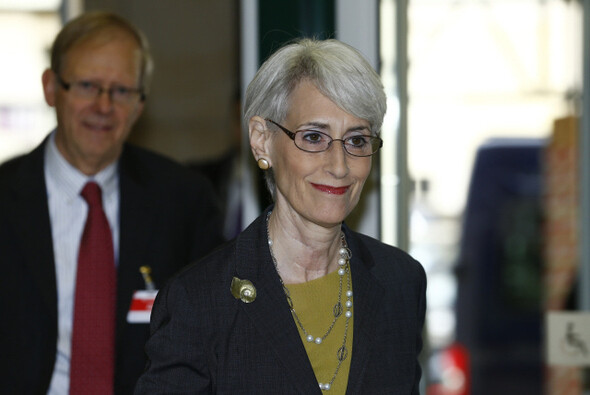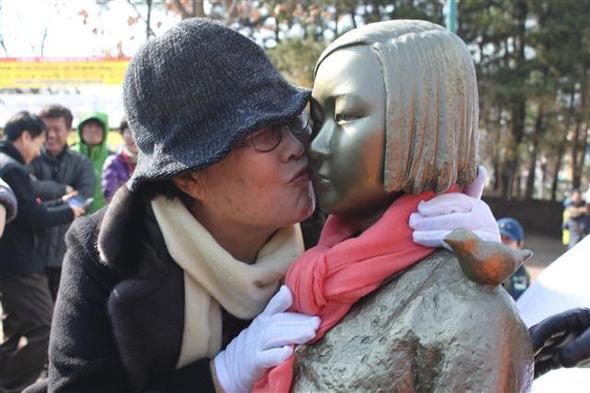hankyoreh
Links to other country sites 다른 나라 사이트 링크
[News anlysis] US changing its tune on historical disagreements involving Japan

Recent comments by Under Secretary for Political Affairs Wendy Sherman are being taken as a warning from Washington that it can no longer ignore conflicts over historical issues that have simmered for years between South Korea, China, and Japan.
Sherman’s speech on Feb. 27 was ostensibly intended to articulate the US’s Northeast Asia policy on the 70th anniversary of the end of World War II. But the delicate timing, with upcoming Washington visits scheduled for the leaders of all these countries, suggests a possibly different message.
Currently, visits to Washington are expected from Japanese Prime Minister Shinzo Abe in late April, Chinese President Xi Jinping around September, and South Korean President Park Geun-hye sometime in the middle of the year. With US Secretary of State John Kerry focusing on Middle East issues and Tony Blinken just recently taking office of Deputy Secretary of State, Sherman is arguably the US‘s main decision-maker on Northeast Asian issues.
The most attention-getting element of the relatively lengthy speech on Northeast Asian historical concerns was its exclusive focus on the three countries joining forces with the US for the future - and the absence of even token calls for Japan to reflect and apologize for past actions. While Sherman did seem to indirectly reference the country’s misdeeds, stating that “we don’t have to look far for a cautionary tale of a country that has allowed itself to be trapped by its own history,” the remark did not appear to carry much weight. It was a definite departure from Washington’s previous calls for Japan to achieve reconciliation and healing with China and South Korea by sincerely reflecting on and apologizing for past actions.
Instead, Sherman praised Japan as a leading long-term supporter of international law and generous contributor to overseas development aid. After a reference to the recent murder of Japanese hostages by the group Islamic State (IS) in which she mentioned discussions on an “appropriate role” for Japan’s Self-Defense Forces, she went on to say Japan was “working to reconcile modern demands with hard-won lessons from the past.”
Also unusual was Sherman’s criticism of East Asian political leaders for exploiting nationalist feelings. Her characterization of the raising of Japanese historical issues by South Korean and Chinese leaders as “provocations” could prove controversial.
“She was talking about China,” a Washington diplomatic source said of the passage.
“The US sees China as trying to pull South Korea into its criticisms of Japan,” the source added.
Under this reading, the message is that China should not attempt to make political use of an upcoming Sept. 3 event for which it plans to invite world leaders to Beijing to commemorate the 70th anniversary of victory in the war against Japan and the world‘s victory over fascism.
But past complaints from US officials about South Korea suggest that Sherman may also have intended the message for Seoul’s ears. Washington has previously expressed bafflement that the leaders of its top two Asian allies South Korea and Japan have yet to hold a summit two years into their terms.
An underlying current in the change in attitude from the US appears to be the perception that it can no longer accept historical concerns weakening its trilateral security cooperation with South Korea and Japan and jeopardizing the counterweight against Beijing.
Another aim may be to reach a swift conclusion with Trans-Pacific Partnership (TPP) negotiations ahead of Abe’s visit. Sources have said the Barack Obama administration’s biggest hope from the Abe government is for agricultural concessions on the TPP. The free trade agreement, which involves 12 countries in Asia and America, is one of the key focuses in Obama‘s “rebalancing Asia” policy. Indeed, some diplomatic observers have gone so far as to suggest that Washington could turn a blind eye to historical concerns if Abe does make concessions on the TPP. If true, it is a situation that could easily backfire with anti-US sentiment in South Korea and China.
“If Under Secretary Sherman’s remarks are representative of the US government, then it’s a big disappointment to us,” said Cho Se-young, a professor at Dongseo University and onetime head of the Ministry of Foreign Affairs Northeast Asia bureau.
“The US should set certain standards when it’s talking about historical perceptions, rather than pretending to be a ‘friendly third party’ and saying that both sides are wrong,” Cho added.
“The US can’t be a bystander on Japan’s historical perceptions - which are a matter of international politics - when it‘s been the driving force behind the post-war order in Northeast Asia.”

By Seong Yeon-cheol and Park Hyun, Beijing and Washington correspondents, Kim Oi-hyun, staff reporter
Please direct questions or comments to [english@hani.co.kr]

Editorial・opinion
![[Column] Park Geun-hye déjà vu in Yoon Suk-yeol [Column] Park Geun-hye déjà vu in Yoon Suk-yeol](https://flexible.img.hani.co.kr/flexible/normal/500/300/imgdb/original/2024/0424/651713945113788.jpg) [Column] Park Geun-hye déjà vu in Yoon Suk-yeol
[Column] Park Geun-hye déjà vu in Yoon Suk-yeol![[Editorial] New weight of N. Korea’s nuclear threats makes dialogue all the more urgent [Editorial] New weight of N. Korea’s nuclear threats makes dialogue all the more urgent](https://flexible.img.hani.co.kr/flexible/normal/500/300/imgdb/original/2024/0424/7317139454662664.jpg) [Editorial] New weight of N. Korea’s nuclear threats makes dialogue all the more urgent
[Editorial] New weight of N. Korea’s nuclear threats makes dialogue all the more urgent- [Guest essay] The real reason Korea’s new right wants to dub Rhee a founding father
- [Column] ‘Choson’: Is it time we start referring to N. Korea in its own terms?
- [Editorial] Japan’s rewriting of history with Korea has gone too far
- [Column] The president’s questionable capacity for dialogue
- [Column] Are chaebol firms just pizza pies for families to divvy up as they please?
- [Column] Has Korea, too, crossed the Rubicon on China?
- [Correspondent’s column] In Japan’s alliance with US, echoes of its past alliances with UK
- [Editorial] Does Yoon think the Korean public is wrong?
Most viewed articles
- 1‘We must say no’: Seoul defense chief on Korean, USFK involvement in hypothetical Taiwan crisis
- 2Will NewJeans end up collateral damage in internal feud at K-pop juggernaut Hybe?
- 3[Column] Park Geun-hye déjà vu in Yoon Suk-yeol
- 4Why Korea shouldn’t welcome Japan’s newly beefed up defense cooperation with US
- 5Thursday to mark start of resignations by senior doctors amid standoff with government
- 6N. Korean hackers breached 10 defense contractors in South for months, police say
- 7[Guest essay] The real reason Korea’s new right wants to dub Rhee a founding father
- 8[Column] ‘Choson’: Is it time we start referring to N. Korea in its own terms?
- 9Kim Jong-un expressed ‘satisfaction’ with nuclear counterstrike drill directed at South
- 10[Editorial] New weight of N. Korea’s nuclear threats makes dialogue all the more urgent